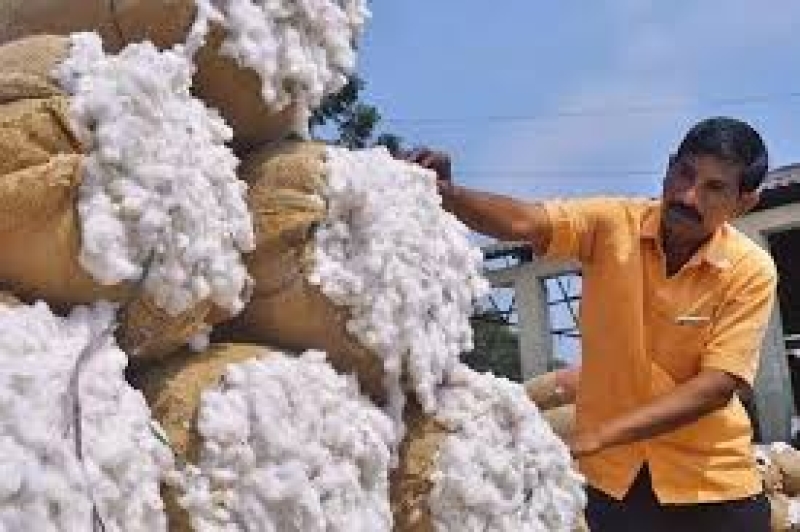- India Sees 9% Drop in Foreign Tourists as Bangladesh Visits Plunge |
- Dhaka Urges Restraint in Pakistan-Afghan War |
- Guterres Urges Action on Safe Migration Pact |
- OpenAI Raises $110B in Amazon-Led Funding |
- Puppet show enchants Children as Boi Mela comes alive on day 2 |
BD Must Secure Stable Cotton Imports to Protect Export Growth

Bangladesh is on track to become the world’s largest cotton importer in the current fiscal year, a reflection of its pivotal geopolitical position and the evolving dynamics of global trade, according to industry experts. However, these same experts warn that ongoing geopolitical challenges could threaten the stability of cotton supplies, potentially disrupting the country’s crucial export sector.
Foreign Affairs Adviser Md Touhid Hossain highlighted the need for Bangladesh to explore importing cotton from the United States to address this potential risk. He explained, “We are considering importing cotton from the US to minimize the trade gap with the country and support US agricultural production.” Hossain emphasized that such imports could provide mutual benefits, offering economic advantages for both American suppliers and Bangladeshi businesses. Additionally, he noted that increasing cotton imports from the US might reduce the likelihood of tariff pressures, particularly under a potential return to the Trump administration.
According to the United States Department of Agriculture (USDA), Bangladesh is set to surpass China as the world’s largest cotton importer during the fiscal year 2024-25. The USDA projects that Bangladesh will import 7.8 million bales of cotton this year, up from 7.5 million bales in FY2023-24. Globally, cotton imports are expected to reach 42.4 million bales, with Bangladesh, China, Vietnam, and Pakistan accounting for 65% of the total. China is forecast to import 8 million bales, followed closely by Bangladesh at 7.8 million, Vietnam at 7.1 million, and Pakistan at 4.8 million.
Cotton is a vital raw material for Bangladesh’s textile and ready-made garment industries, sectors that play a central role in the nation’s economy. However, despite the optimistic import forecast, local textile mill owners are facing operational challenges due to a persistent gas crisis, with many factories running below capacity. Showkat Aziz Russell, President of the Bangladesh Textile Mills Association (BTMA), noted that the government has taken steps to limit incentives for certain garment sectors and suspend Indian yarn imports through land ports. These measures, he believes, will encourage more domestic textile production in the coming months.
“Bangladesh’s textile industry produces world-class yarn, essential for high-quality fabrics. Reducing low-quality yarn imports via land ports strengthens our domestic industry and ensures we remain competitive on the global stage,” Russell explained. He stressed that securing a stable cotton supply chain is essential to maintaining the country’s export momentum, with the US market being a key option for diversification.
Muhammad Ayub, General Secretary of the Bangladesh Cotton Association, echoed this sentiment, stressing the need for reliable and uninterrupted cotton imports to meet export deadlines. “Currently, around 50% of Bangladesh’s cotton imports come from African countries. However, ongoing conflicts and instability in many African nations pose a significant risk to this supply,” Ayub explained. He added that sourcing cotton from the US could mitigate potential tariff-related challenges, provided the price remains competitive.
Experts also advocate for diversifying cotton sources and boosting domestic production to buffer against future global supply shocks. Dr Md Fakhre Alam Ibne Tabib, Executive Director of the Cotton Development Board, highlighted that cotton is currently being cultivated on 46,000 hectares of land in Bangladesh, with a production target of 228,000 bales this year. However, the country’s annual demand for cotton remains around 8.5 million bales, with approximately 8.3 million bales needing to be imported each year—at an estimated cost of Tk 35,000 crore.
Bangladesh’s textile and clothing industry is a vital part of its economy, with over $22 billion in primary investment and accounting for 13% of the country’s GDP. The sector includes nearly 1,850 BTMA-member mills and represents more than 86% of national export earnings. Cotton fibers make up 71% of the materials used in the industry, with non-cotton fibers comprising the remaining 29%.
As Bangladesh looks to maintain its position as a leader in global cotton-based manufacturing, experts agree that securing a stable, diversified supply of cotton will be crucial to ensuring the continued growth of its export-driven economy.

